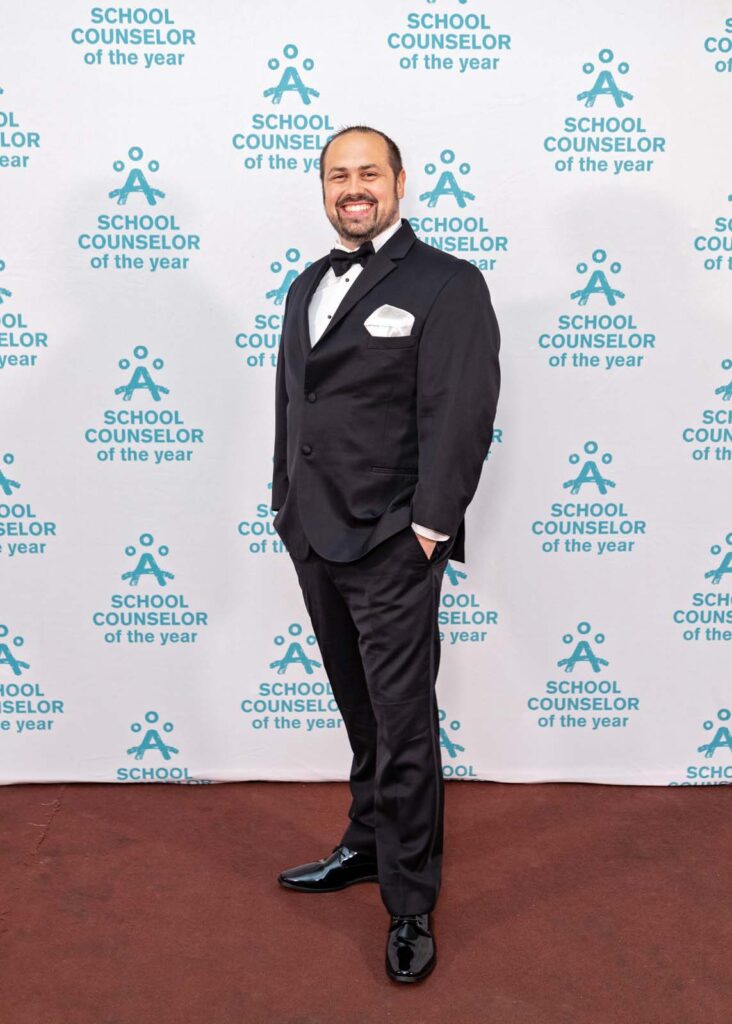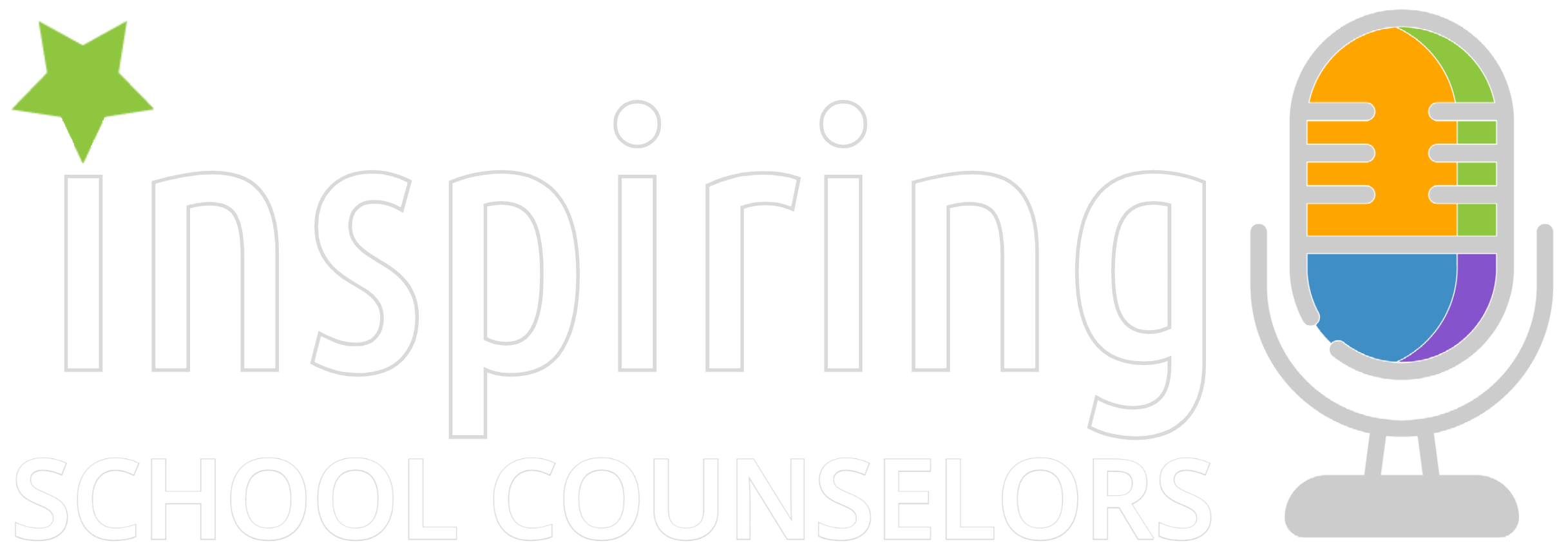The title of this week’s podcast summarizes the content of a robust conversation with Elementary School Counselor Josh Nelson about several practical resources that can help ANY student succeed. Listen in on this chat with one of the 2023 ASCA National School Counselor of the Year finalists.

About Josh Nelson
Joshua Nelson is a 2023 ASCA National School Counselor of the Year finalist, the 2022 Florida School Counselor of the Year, 2021 Lucille Crysell [Duval County Public Schools] School Counselor of the Year, and a 2020 Recognized ASCA Model Program (RAMP) Award Recipient. Prior to serving in his current role as School Counselor at Richard Lewis Brown Gifted and Talented Academy in Jacksonville, Florida, Josh was an Elementary Teacher for six years working at four different Title I schools. Josh says he loves being a school counselor “because I have the opportunity to work with all students to ensure they are safe and give them tools to be successful in the classroom and life.”

Resources
Josh recommends these resources:
- Trust Based Relational Intervention Resources and Courses
- Fostering Resilient Learners, Souers, K., & Hall, P. A. (2016)
- Spot of Emotions Tools (Diane Alber on Amazon):
- A Little Spot of Feelings and Emotions: Educator’s Guide by Diane Alber
- A Little Spot of Emotion Box Set by Diane Alber
- A Little Spot of Feelings Box Set by Diane Alber
- Feeling Detective Plush with 8 mini emotions
- Zones of Regulation Curriculum
- The Zones of Regulation: A Curriculum Designed to Foster Self-Regulation and Emotional Control, Kuypers, L. M., & Winner, M. G. (2021). Think Social Publishing, Inc.
- Other Zones of Regulation Resources:
- The Road to Regulation & The Regulation Station: Understanding and Managing Feelings & Emotions 2-Storybook Set, Leah Kuypers Elizabeth Sautter
- Tools to Try Card Decks Across the Ages, Leah Kuypers Elizabeth Sautter
We Want to Hear from You!

What’s your best advice for other school counselors? Who has influenced you? What books do you recommend? We want to know! Please take a few minutes to complete the Inspiring School Counselors form.
Subscribe
Inspiring School Counselors is available on these podcast apps and others. If you can’t find the podcast on your favorite app, let us know and we’ll make sure we get there. If you prefer to listen in your browser, visit https://inspiresuccess.org/podcast every week for a new episode. For new episode notifications and more, follow Inspire Success on Facebook, Instagram, or Twitter.
Transcript
A rough transcript follows.
Matt Fleck:
Thank you for joining us for another Inspiring School Counselors podcast with resources and ideas from some of the most effective school counselors in the country. I’m Matt Fleck with Inspire Success and we so appreciate you listening. My colleague Aimee Portteus interviewed Josh Nelson this week. Former elementary school teacher and now school counselor at Richard Lewis Brown Gifted and Talented Academy in Jacksonville, Florida. Josh also just happens to be one of the 2023 ASCA National School Counselor of the Year finalists and an all around good guy. Aimee began her conversation with Josh asking him to identify what tools and resources an elementary level school counselor of the year recommends no school be without.
Josh Nelson:
When I think about physically at the school, I think one of the most important things is to have a sensory room available for students and a sensory room when students become dysregulated. When students just need a moment, um, whether it’s because they’re anxious or because they’re feeling sad or because they’re overwhelmed with emotions of anger, is to have a safe space for students to go so that they can regulate, whether it’s using sensory tools or just a place that the lights can turn down a little bit or give some good, um, noise for them just to relax in or give them a, like we have a Lego table, just something to get their minds off of what’s going on. And that resource is huge. It’s been so important here at our school where it’s not a negative thing to go to the sensory room to take a moment.
And that’s helped us to cut down on referrals. It’s helped us to build success academically. It has been life changing here at our school. So having that sensory room is so important. And then thinking about a physical res or a resource in connection to books and training, I would definitely say, um, trust-based relational intervention also known as TBRI. And so it’s all about finding ways that we connect and empower our students and understanding how trauma affects our children. We know since Covid o majority of our students have experienced some form of trauma and we know that trauma affects the brain and having an understanding of the effects of trauma on students and how and why they do certain behaviors instead of looking at behaviors saying, well, these are, these are the negative things that you’re doing, but asking the question why, what is that you need? Right? And by using that and creating that as the, the foundation of everything we do at our school has really helped create positive change, um, with our students and our teachers and as a school community.
Aimee Portteus:
That’s awesome. I do wanna take half a step back and go back to your sensory room concept. Can you kind of walk me through what a typical experience for a student in the sensory room would be?
Josh:
Yeah. So what we did is, I implemented a sensory room about two years ago. We started with the whole, um, piece and we started by having calm down corners in every classroom. Mm-hmm. <affirmative>. So we, uh, taught zones, regulations, um, here in our school and that teaches you about that. There’s various types of emotions and within those emotions we can take and categorize ’em into green means you’re ready to go. Um, blue, you’re running slow, yellow as you need to slow down and read as you need to stop. So I did classroom lessons and taught students across the entire school those things about our emotions and ways to categorize them. And then we talked about tools. I did a, I created a series called A Strategy A Day, keeps us Learning Every Day. And it was a 15 day mini-series that I would do via video.
And I piped those into the classroom and I taught the students different tools that they can use when in those different zones that can help them to regulate. So we created those calm down corners. As a result of relationship with my pta, they supplied the calm down corners for every classroom. We implemented that and then I wrote a grant and I was able to get the sensory room. So what we do is students can self-refer themselves to the sensory room or teachers can refer ’em to the sensory room if they see that they’re getting dysregulated in the calm down corner isn’t enough space for ’em. And so they can then come to the sensory room and we actually created a form that helps us, um, in that, um, communication piece. Cuz I may not always be available. They may not need to see the school counselor, they just may need a moment.
So I’ve trained our administrators and I’ve trained our school nurse and our front desk people on ways to work to support students when they’re in the sensory room. Give ’em some space, allow them to find the tool that works best for them cuz they’ve learned about all the tools. They know what the tools are used for and then give them that time. And we normally set, um, a timer for students so that they can then say, okay, I’m ready to go back to class or, you know what, I may need a few more minutes. Mm-hmm. <affirmative>. So we have that connection, we take that opportunity, we then talk after and we say, well, what is it? Which tool helped you? How and why did that help you? What is that you need right now? And we then set ’em up for success as they head back to class in that. So for some students that may take five, 10 minutes for other students that may take 20, 30 minutes. Right. But what we’re doing is we’re meeting the needs of students and as we meet those needs of students, they know that they are not in trouble when they come to the sensory room. Right. They know this is a safe place that I can work to get my emotions back together and so I can return to class and do my best.
Aimee:
And your teachers have, uh, buy-in to all of that? They feel comfortable with that? They see benefit to it?
Josh:
Most certainly. And we have seen drastic, drastic decline in our behavior referrals over like hundreds of, of referrals negative as a result of creating these systems in our school. And what that’s done is it’s boosted our academic achievement. Right. And students, their safety, their felt, their felt safety here at school and their connection that they’re building has all been exponentially improved.
Aimee:
I like what you just said that it’s the building of the system.
Josh:
Most certainly.
Aimee:
That’s really impactful. That’s awesome. So if you were talking to a school counselor or a school district that knew trauma was something they need to be informed about but didn’t know what steps to take first, what would you suggest?
Josh:
Well, I would start by suggesting to look in TBRI. Like it’s through TCU. They’re the ones, um, that created that whole, um, trust-based relational intervention. They have all types of different trainings that they offer, um, through there. Um, but then also another influential book that I read was Fostering Resilient Learners and it was by Kristen Souers. And so it looks at the mental health of students and it looks at it from, I believe it was a principal’s perspective in that book. And they talked about what are the things that we can do in our school to build a trauma informed school. It allows our students to feel safe and for them to be themself and for them to express their needs so that we can work together to meet those needs.
Aimee:
So it’s expanding our capacity beyond being a lifeguard too. Backing up and figuring out why they fell in in the first place, right?
Josh:
Most certainly. And, and coming about it with a, with a heart of compassion and a place of understanding that, um, one of the quotes that’s made in the book is, you know, you may be damaged but you’re not permanently broken. And that is we have the power as educators, as school counselors to help create new pathways for our children. And how amazing is that, that we can take something that’s an event in the child’s life that caused so much hurt and create a place of newness for them.
Aimee:
And transform the trajectory of where they’re headed.
Josh:
Most certainly.
Aimee:
I love that. Okay, so we like to end our podcast with some RapidFire questions. So I want you to give me your first thought on these questions. You ready?
Josh:
Okay. I think so.
Aimee:
Okay. What song or activity helps you processs after a long day?
Josh:
Activity? Oh, I would say I do my activity in the morning, probably running and running each morning.
Aimee:
Okay. Okay. I’m sorry, I have to go outside. How far do you run?
Josh:
I normally run about a 5k about three or four times a week.
Aimee:
Good for you. Good for you. Who’s your favorite superhero?
Josh:
I would say my favorite superhero is Flash just because he can go really, really fast and get things done. I wish I had a superpower. <laugh>
Aimee:
Especially when you’re running a 5k. Right. <laugh>?
Josh:
Uh, I don’t care about that. I just have too many other things to do. <laugh>
Aimee:
<laugh>. What’s the most unusual or unique item in your office right now?
Josh:
The most unique item I have in my office right now would probably be, probably, my friend Spot over here. <laugh>
Aimee:
Your friend’s Spot
Josh:
My friend Spot. So by spot of emotions? Um, so it is a spot, um, little stuffy and inside of ’em are filled with many different emotions. If I was to ask my students here, it would probably be my puppet that I use with my littles because they’re always like, he, he looks weird and so on my littles, they like my puppet. So like the puppets.
Aimee:
Yeah. And last one, what’s the thing you enjoy most about being a school counselor?
Josh:
Oh, the thing I love most about being a school counselor is being able to connect with students and families. I love being able to, um, see their successes and celebrate their successes. I love to be here for them when they’re having a hard day and just to cheer them up and to give them the encouragement that they need to keep going.
Aimee:
Awesome! Thank you so much for being with us today, Josh. I would love to come visit your school someday.
Josh:
Well, come on down. We’re here in Jacksonville.
Aimee:
I’m gonna come in the winter. You know, I’m coming down.
Josh:
I was gonna say in the wintertime <laugh>.
Aimee:
That sounds good.
Josh:
My um, my winter coat on. And you’ll be ready to go out to the beach.
Aimee:
Yeah, exactly. Exactly.
Matt:
A shout out to all of you who went to Florida for spring break this year. Hope it was warm. We appreciate you, Josh, and all of the school counselors of the year who have joined us on our podcast this year. And last I’ve learned so much and we hope you have too. You can find links to the resources Josh mentioned in this podcast and links to the resources and audio from prior podcasts on our Inspire success website at inspiresuccess.org/podcast. A brief reminder that we’re coming down to our final few podcasts as we wrap up and close shop, but we’re not done yet. So be sure to join us again next week. Another Inspiring School Counselor’s podcast.
